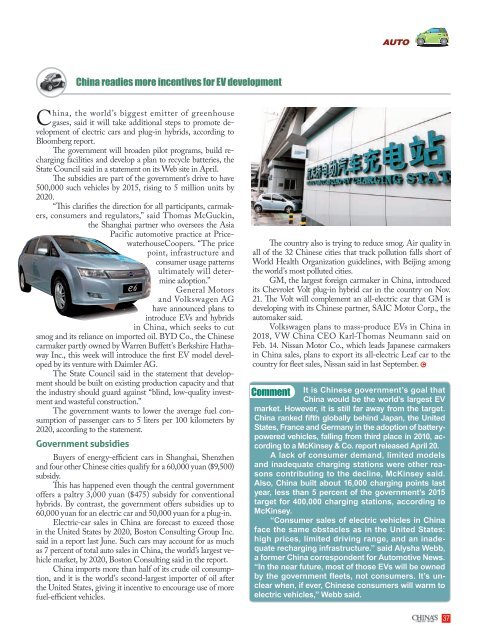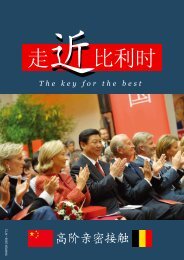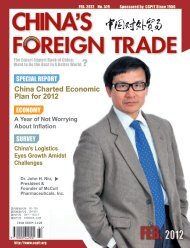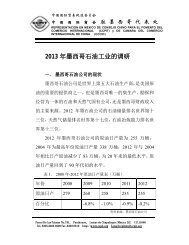F REIGN TRADE - 中国国际贸易促进委员会
F REIGN TRADE - 中国国际贸易促进委员会
F REIGN TRADE - 中国国际贸易促进委员会
You also want an ePaper? Increase the reach of your titles
YUMPU automatically turns print PDFs into web optimized ePapers that Google loves.
AUTOChina readies more incentives for EV developmentChina, the world’s biggest emitter of greenhousegases, said it will take additional steps to promote developmentof electric cars and plug-in hybrids, according toBloomberg report.The government will broaden pilot programs, build rechargingfacilities and develop a plan to recycle batteries, theState Council said in a statement on its Web site in April.The subsidies are part of the government’s drive to have500,000 such vehicles by 2015, rising to 5 million units by2020.“This clarifies the direction for all participants, carmakers,consumers and regulators,” said Thomas McGuckin,the Shanghai partner who oversees the AsiaPacific automotive practice at PricewaterhouseCoopers.“The pricepoint, infrastructure andconsumer usage patternsultimately will determineadoption.”General Motorsand Volkswagen AGhave announced plans tointroduce EVs and hybridsin China, which seeks to cutsmog and its reliance on imported oil. BYD Co., the Chinesecarmaker partly owned by Warren Buffett’s Berkshire HathawayInc., this week will introduce the first EV model developedby its venture with Daimler AG.The State Council said in the statement that developmentshould be built on existing production capacity and thatthe industry should guard against “blind, low-quality investmentand wasteful construction.”The government wants to lower the average fuel consumptionof passenger cars to 5 liters per 100 kilometers by2020, according to the statement.Government subsidiesBuyers of energy-efficient cars in Shanghai, Shenzhenand four other Chinese cities qualify for a 60,000 yuan ($9,500)subsidy.This has happened even though the central governmentoffers a paltry 3,000 yuan ($475) subsidy for conventionalhybrids. By contrast, the government offers subsidies up to60,000 yuan for an electric car and 50,000 yuan for a plug-in.Electric-car sales in China are forecast to exceed thosein the United States by 2020, Boston Consulting Group Inc.said in a report last June. Such cars may account for as muchas 7 percent of total auto sales in China, the world’s largest vehiclemarket, by 2020, Boston Consulting said in the report.China imports more than half of its crude oil consumption,and it is the world's second-largest importer of oil afterthe United States, giving it incentive to encourage use of morefuel-efficient vehicles.The country also is trying to reduce smog. Air quality inall of the 32 Chinese cities that track pollution falls short ofWorld Health Organization guidelines, with Beijing amongthe world’s most polluted cities.GM, the largest foreign carmaker in China, introducedits Chevrolet Volt plug-in hybrid car in the country on Nov.21. The Volt will complement an all-electric car that GM isdeveloping with its Chinese partner, SAIC Motor Corp., theautomaker said.Volkswagen plans to mass-produce EVs in China in2018, VW China CEO Karl-Thomas Neumann said onFeb. 14. Nissan Motor Co., which leads Japanese carmakersin China sales, plans to export its all-electric Leaf car to thecountry for fleet sales, Nissan said in last September.Comment It is Chinese government’s goal thatChina would be the world’s largest EVmarket. However, it is still far away from the target.China ranked fifth globally behind Japan, the UnitedStates, France and Germany in the adoption of batterypoweredvehicles, falling from third place in 2010, accordingto a McKinsey & Co. report released April 20.A lack of consumer demand, limited modelsand inadequate charging stations were other reasonscontributing to the decline, McKinsey said.Also, China built about 16,000 charging points lastyear, less than 5 percent of the government’s 2015target for 400,000 charging stations, according toMcKinsey.“Consumer sales of electric vehicles in Chinaface the same obstacles as in the United States:high prices, limited driving range, and an inadequaterecharging infrastructure.” said Alysha Webb,a former China correspondent for Automotive News.“In the near future, most of those EVs will be ownedby the government fleets, not consumers. It’s unclearwhen, if ever, Chinese consumers will warm toelectric vehicles,” Webb said.37

















